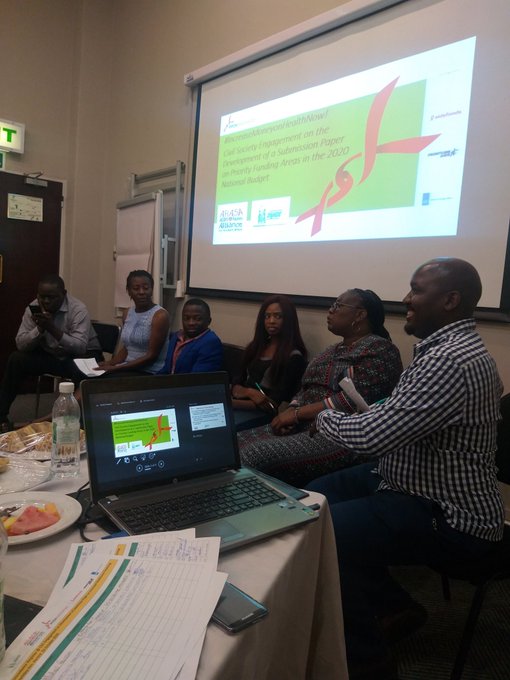By Joyce Mukucha
Driven by the desire to ensure that sustainable quality health delivery systems prevail in Zimbabwe, the Civil Society Organisations (CSOs) are demanding for the increase of health financing in the 2020 National Budget to promote health, dignity and wellbeing of citizens.
The CSOs advocacy core team suggested that domestic financing of health budget should be increased from 8, 3 percent to 15 percent of the National Budget as recommended under the Abuja Declaration, which Zimbabwe is signatory to.
According to the global health 2017, it has been learnt that there was limited investment funding, low income, with middle- income countries accounted for a higher percentage of the total population, a higher percentage of the diseases burden and a lower percentage of total health spending.
Speaking during the Civil Society Engagement on the Development of a Submission Paper on Priority Funding Areas in the 2020 National Budget in Harare on the 23 rd of October 2019, SAfAIDS and Partnership to Inspire, Transform and Connect the HIV response (PITCH) Country Focal Person, Lloyd Dembure pointed out that it was important to identify community priority funding needs and how best more resources can be mobilised as well as identifying opportunities and new initiatives to increase money on sustainable quality health delivery systems.
“In terms of the Abuja Declaration 2001 on HIV/AIDS, TB and on the related Infectious Diseases, there is need to provide a business model-investing for impact. There is need for policy and programme interventions, advocacy and capacity building pertaining strengthening of health systems and domestic financing. There is deep-rooted structural problems inequality and weak health delivery system particularly Zimbabwe where there is shortage of medications as well as doctors going on strike. Inefficiency in health is about 20 percent to 40 percent of health resources are wasted, according to the World Health Organisation.
“Strategic approaches such as accountability, financing, community engagement are of significance importance community participation plays a pivotal role in reduction of Non Communicable Diseases. Thus, there is need to mobilise and engage civil society on priority areas of funding on healthcare to be presented to Parliament Portfolio Committees,” he said.
In as much the Catalytic Framework is concerned to end AIDS, TB, eliminate malaria in Africa by 2030, he indicated there was need for re-alignment with the Abuja Declaration plus 12 commitments, Sustainable Development Goals and Agenda 2063 goals.
Sharing experience on HIV and funding in Zimbabwe community voices, representatives from Key Population Groups (KPs) Young People living with HIV (YPLHIV), Adolescent Girls and Young Women(AGYW), People Living with HIV(PLHIV) and Civil Society Organisations(CSOs) articulated that there was still a big gap still existing in terms of domestic drug funding in Zimbabwe.
They indicated that there was discrimination as some other key population groups that include drug users, commercial sex workers were being marginalised, in that way killing the morale of the people who need critical help.
The Zimbabwe Young Positives representative, Kelvin Makura highlighted that it was of paramount importance as a nation to have adequate of resources, there should be funding YPLHIV.
“Young people are the future of tomorrow and we feel that funding locally is limited. We rely on external funders so there is need to increase. It is vital to prioritise health for all as well as put people living HIV on the care centre. There is huge gap in terms of representation of adolescent and young people,” he said.
Other challenges that were articulated concerning offering priority funding on health include; gap between political declaration and concrete action where there are encounters in transforming commitments into actions, lack of enforceability, lack of accountability, lack of willingness to prioritise health in the budget, lack of resources.
“We want representation and inclusion, explanation on what added value to PLHIV. We need Universal Health Coverage and we call upon Government to take actions. It’s degrading to humiliate women and people living with HIV by mentioning that they have no capacity. Such issues really need to be addressed. There is need to engage with different stakeholders to ensure that quality health and representation is extended to YPLHIV, PLHIV amongst other key population groups.
“There is need to increase accountability and transparency on the AIDS Levy as well as guaranteed allocation disbursement of forex for medicine, commodities and health related essentials” said, Tendayi Westerhof, a Zimbabwean HIV activist.
Participants who attended the conference recommended that there should be increased treatment allocation of National Trust Fund (NAFT) from 50 percent to 75 percent of overall funds raised to alleviate the treatment gap. They also emphasised that it was critical to engage private local companies to invest in health. Government, they said should set US$24 million a year to enhance Local Pharmaceutical Production through investing in major manufacturers.
The conference was attended by different CSOs which include AIDS Fonds, Frontline AIDS, SAfAIDS, ARSA and PITCH.






